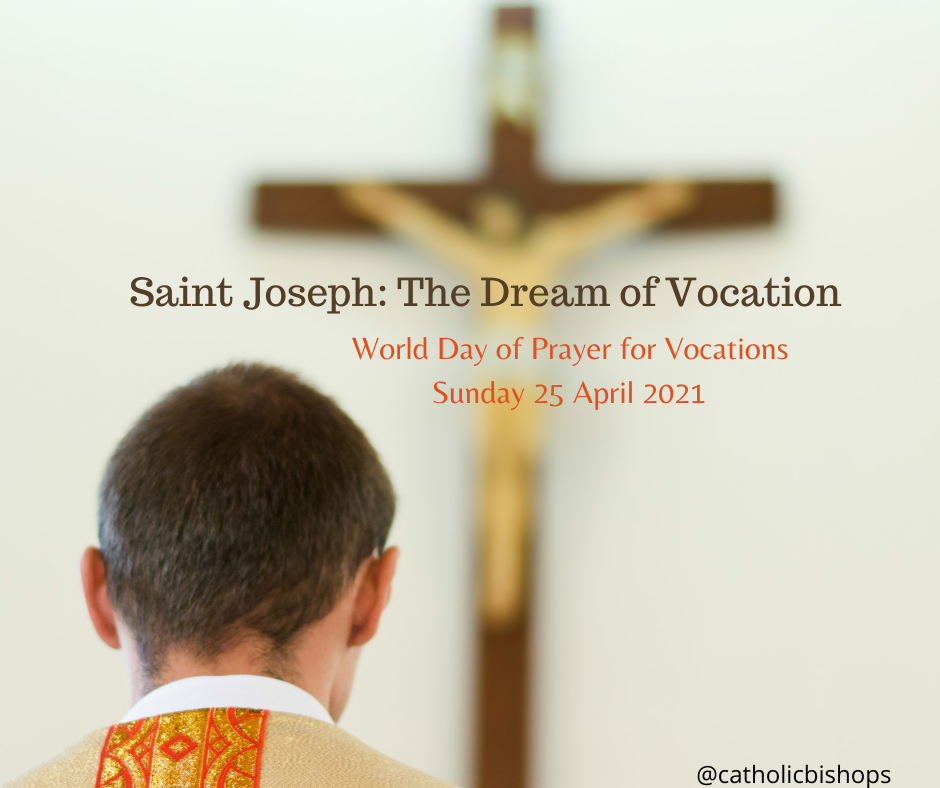Pope Francis has released his Message for the World Day of Prayer for Vocations, which falls this year on Sunday 25 April.
The Pope held up the husband of the Virgin Mary and foster-father of Jesus as a model for all members of the clergy and religious men and women. He drew heavily on his Apostolic Letter Patris Corde, released on 8 December 2020, which seeks to “increase our love for this great saint.”
Saint Joseph, said the Pope, is an extraordinary figure, not because of any astonishing charism or special status, but because he accomplished extraordinary acts of service in his daily life.
“God looks on the heart,” he said, “and in Saint Joseph He recognized the heart of a father, able to give and generate life in the midst of daily routines.”
Vocations, he added, have the same goal of begetting and renewing the lives of others.
The priesthood and consecrated life, he said, require men and women with open hearts, who are “capable of great initiatives, generous in self-giving, compassionate in comforting anxieties and steadfast in strengthening hopes.”
Chasing a dream
Pope Francis went on to focus on three key words which St. Joseph suggests for each individual’s vocation: dream, service, and fidelity.
The Gospel of Matthew recounts four dreams with which God inspired St. Joseph, each of which represented a difficult call from God.
“After each dream, Joseph had to change his plans and take a risk, sacrificing his own plans in order to follow the mysterious designs of God, whom he trusted completely.”
Though it seems strange to us that he would put so much trust in dreams, the Saint let himself be guided without hesitation.
“Why?” mused the Pope. “Because his heart was directed to God; it was already inclined towards Him. A small indication was enough for his watchful ‘inner ear’ to recognize God’s voice.”
God’s call to each of us, said Pope Francis, happens in the same way, without putting pressure on our freedom. “He does not overwhelm us with dazzling visions but quietly speaks in the depths of our heart, drawing near to us and speaking to us through our thoughts and feelings.”
Yet, as St. Joseph demonstrates, our acceptance of God’s call cannot be passive, but requires us to press forward and take risks by abandoning ourselves to grace.
Pope Francis then considered St. Joseph’s vocation to service.
“The Gospels show how Joseph lived entirely for others and never for himself,” he said. “By freeing love from all possessiveness, he became open to an even more fruitful service.”
His limitless, selfless love led the Saint to sustain daily sacrifices, as a rule for daily life.
“He adapted to different circumstances with the attitude of those who do not grow discouraged when life does not turn out as they wished,” said the Pope. “He showed the willingness typical of those who live to serve.”
Pope Francis added that he likes to think of St. Joseph as the “protector of vocations,” since his willingness to serve fills him with a “concern to protect.”
“Such thoughtful concern is the sign of a true vocation,” he said, “the testimony of a life touched by the love of God.”
In simple, daily fidelity
Fidelity, said the Pope, is the third aspect of St. Joseph’s example for all consecrated persons.
He always patiently pondered his actions, and knew that “success in life is built on constant fidelity to important decisions.”
Pope Francis said God teaches each of us how to nurture fidelity “in the light of God’s own faithfulness.”
“This fidelity is the secret of joy,” he noted. “It the joy of simplicity, the joy experienced daily by those who care for what truly matters: faithful closeness to God and to our neighbour.”
Example of joy
The Pope concluded his message for World Day of Prayer for Vocations by urging the Church’s ministers to fill their homes with this same “simple and radiant, sober and hopeful” joy.
“I pray that you will experience this same joy, dear brothers and sisters who have generously made God the dream of your lives, serving him in your brothers and sisters through a fidelity that is a powerful testimony in an age of ephemeral choices and emotions that bring no lasting joy.”
ENDS
Source: Vatican News article by Devin Watkins
Image: www.catholicbishops.ie


